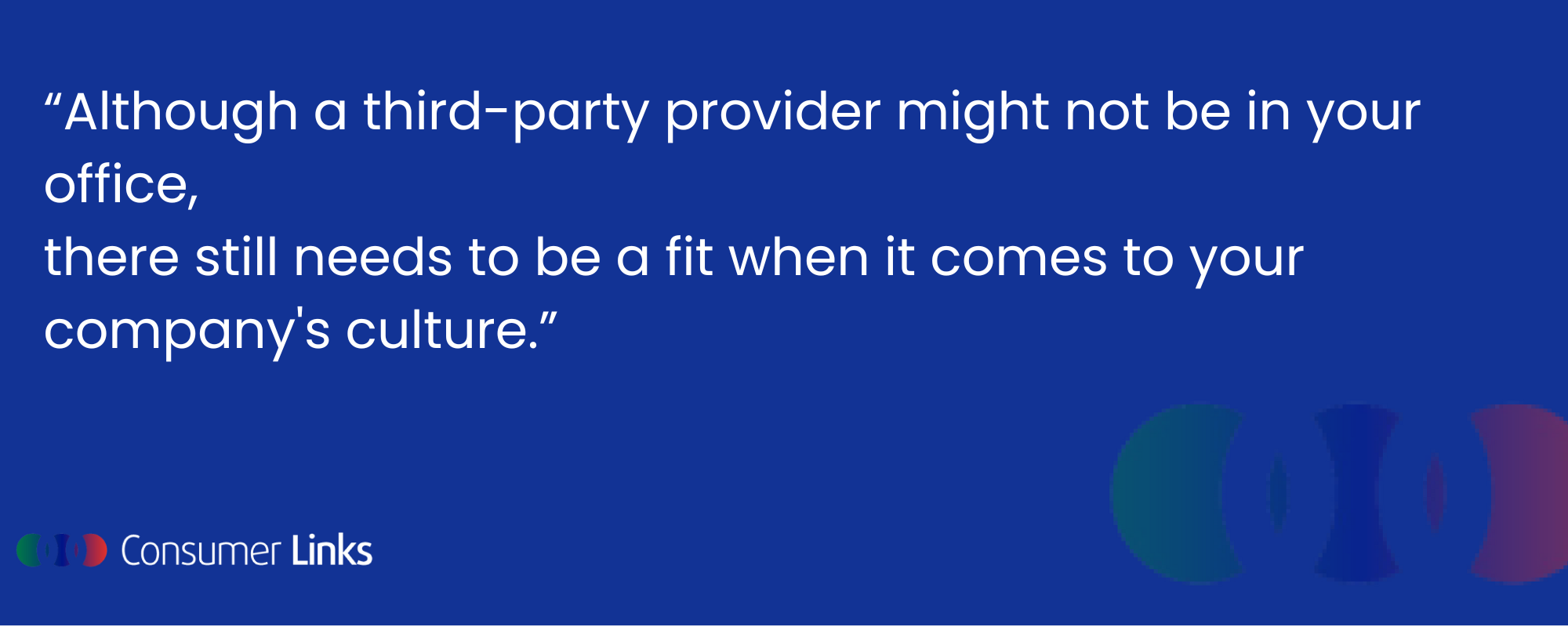Did you know that the US outsources around 300,000 jobs annually? Or that America is responsible for over 84% of outsourcing deals worldwide?
According to statistics, it is more than just big businesses tapping into the benefits of working with an outsourcing partner. About 37% of small businesses have dipped into working with an outsourced team for a project.
On the other hand, smaller businesses with fewer than 50 employees might have opted to forego working with an outsourced team and keep processes in-house.
In a third scenario, companies might choose a hybrid model where they have in-house staff as well as outsourcing services, which allows them to focus on their core business thanks to an external partner taking care of one or two projects.
No two businesses have the exact requirements for working with an in-house team versus an outsourced team. Some might want to outsource an entire project while hiring in-house could be a preferred model for others.
Ultimately, it depends on how a business owner wants to scale and grow.
In this article, we look at considerations that could impact which model would suit your business best, as well as the pros and cons of in-house vs. outsourcing.
In-house vs outsource: What are the differences?

In its most basic definition, an in-house team works within a business.
Team members are hired for specific roles and are responsible for tasks for which they have the necessary skills.
In-house employees are often more attuned to company culture and would like to have completed some form of team member training.
They are geared toward their company’s success and familiar with the tangible environment of their job space.
An outsourced team, in comparison, is a third-party provider that can complete tasks as briefed by a client.
These outsourced team providers are usually remote and can be either overseas or in another area of the businesses they serve.
Where in-house staff are paid salaries and other compensation as determined by their employer, an outsourced team will have a different payment model. This is typically a fixed price as compensation for time and materials.
Considering these differences between in-house employees and outsourcing services, let’s review both categories’ benefits and potential disadvantages.
In-house vs outsourcing: The pros and cons

Why choose an in-house team?
Here are some of the most significant advantages of exclusively hiring in house, and why it can be a good fit for a business.
Pros
1. An in-house team can provide a level of familiarity
Staff who work in-house are used to a specific work environment. They know the ins and outs of a business and have a clear scope of daily operations and how this relates to your company’s core business.
If they have been working at a company for a while, there is no need to introduce them to your business goals or ethos, as they will already have been on-boarded when they were hired.
2. An in-house team can assist in protecting Intellectual Property (IP)
Employers who want to ensure that company innovations, ideas and patents stay within the business can rely on in-house employees to be gatekeepers of business IP.
In-house teams provide a sense of loyalty and peace of mind, ensuring a business is not exploited by competitors.
3. Businesses have access to in-house specialists
In-house teams can provide on-site specialized skills and support for in house team members. These talented in-house staff members can strengthen business operations and ensure success.
Cons
1. Hiring an internal team could bring about training costs
A brand-new in-house team, or in-house members who are joining a business for the first time, might require time-consuming, costly training.
This can also hold up production and sales, potentially impacting whether your company achieves its monthly or quarterly goals.
2. When you need to find subject matter experts, your team’s skills might not be sufficient
For certain specialist areas, such as legal processes, an outsourced team could trump in-house members whose focus areas align more with operations or strategy.
Additionally, if your team’s skills are not sufficient in critical areas such as sales and marketing, then a seasoned outsourced call centre could outweigh trying to build a team from the ground up..
3. High staff turnovers can significantly impact the in-house skills that a business has access to
When in-house employees decide to move on to other external companies, it can take some time to find suitable replacements and schedule interviews.
The in-house hiring process can only prove successful if suitable candidates are immediately available.
Why choose an outsourced team?

Now, let’s review some advantages of hiring an outsourcing team:
Pros
1. A third-party company could have the necessary infrastructure to complete a project successfully
This means your business can invest in something other than additional office equipment, such as computer and phone hardware, and can still get the services they need to fulfil business objectives.
2. Hiring an outsourcing team can be cost-effective and save money
Businesses using fixed-price models can effectively budget for projects when outsourcing tasks.
There is no need to plan for full salaries, as the project agreement will determine the total project remuneration.
In places such as the UK, where the living wage is increasing, this can be significant cost savings.
3. An outsourced partner can take some pressure off time-consuming tasks
Where a business would have been stretched for time if specific tasks were done in-house, an outsourcing partner can relieve teams by handling particular projects.
This means business needs can easily be met thanks to collaborating with third-party providers.
Want Free Outsourcing Advice?
Gain Access to our Outsourcing Consultants today
4. Outsourced partners bring core competencies to the table
Thanks to their specialized skill sets, outsourced parties can spur development and growth strategies, providing valuable input as and when needed to fill knowledge gaps.
Cons
It is important to keep some of the constraints of hiring outsourcing services in mind, however:
1. Time zone differences could impact productivity
If an outsourced partner’s time zone is several hours behind or before your business, it might be difficult for a company to contact them.
This could cause frustration if any delays impact business operations.
Business owners who need quick, easy contact with a provider should ideally look to an outsourced partner in a similar time zone or close enough to ensure no communication delays.
2. On-site availability is (mostly) not possible
When working with remote teams based in other countries, the chances of having outsourced partners on site are slim – unless a company funds traveling costs for a consultation visit.
This means that communications need to be conducted as best as possible to ensure everyone is on board with how a project is tracking.
Structures must be in place to ensure a clear understanding of reporting lines and all communication channels.
Here at Consumer Links, we do have on-site UK support if required.
3. A company’s culture might not be top of mind for an outsourcing team
With in-house hiring, a new team member can quickly be introduced to what a company’s culture is all about.
Existing employees have become familiar with their brand’s ethos and how to make it part of the golden thread of their daily business operations.
However, in the case of an outsourced partner, it is essential to remember that they might be more focused on the job.
However, some guidance can be given to ensure you and your outsourced partner align with your working method.
4. Complete control might not necessarily be possible
A business owner might only sometimes be present during the initial boarding period or other projects that third-party providers are responsible for.
This means there needs to be a high level of trust between the provider and the company it works for.
There must be optimal communication channels, and expectations must be established before any work commences. This approach will ensure your outsourcing partner knows precisely what is expected of them.
Are in-house teams better than an outsourced team?

In the case of in-house vs. outsourcing, an essential element is weighing up the strengths of both service areas and what suits your business needs best.
An outsourcing provider can bring global talent within your reach at lower labor costs and with specialized skills. Your chosen provider could provide access to tech and tools you might not have previously, which can enhance the outcome of your business project management.
On the other hand, in-house staff can manage core tasks for your business. They can be crucial in maintaining your business strategy and keeping operations on track.
Therefore, as mentioned earlier, both in-house and outsourcing have significant advantages.
The process you focus on the most will depend not only on your budget but also on the scope of work and whether a particular skilled function can be handled in-house rather than by an external partner.
What are some common use cases for outsourcing?

Outsourcing can be used for several business tasks, such as back-office functions, accounts receivable services, and recruitment.
Thanks to global expertise, these expert tasks can be provided by remote teams – and easily monitored by business owners, thanks to digitally enabled software and networks.
Customer service outsourcing, lead generation, and appointment setting are further examples of how outsourcing can become part of business processes.
An essential element for these collaborations to succeed is undoubtedly solid relationships between the right workforce and businesses. There needs to be trust and an easy way of working to ensure every task is completed successfully.
Therefore, businesses must ensure that when they choose outsourced providers, they hire for expertise and request proven client satisfaction.
Want Free Outsourcing Advice?
Gain Access to our Outsourcing Consultants today
How do you maintain a good balance between outsourcing and using in-house employees?

When making the case for in-house vs outsource, business owners should always consider which essential business tasks would be better suited for in-house hiring.
Specific core tasks must remain in-house to ensure a company can meet its business needs and stay competitive.
That being said, you must remember that a prominent role of outsourcing is to provide the expertise that a business might need to gain. It “balances the scales” by supplementing the talent that a company has access to ensure all skills are available for tasks.
So, consider which resources you have in-house and which you will need to outsource to potentially complete your business offerings.
When to handle projects in-house

There are some use cases where project management should ideally be handled in-house.
Say, for instance, your business works with confidential customer data or a secretive project.
An in-house team could give more control in safeguarding this information from any breaches, as well as keep the information out of the ears of competitors.
Also mentioned earlier, protecting intellectual property is vital, and handling this in-house can reduce risks and facilitate more control.
Another area where in-house hiring is better suited for a business is when you need to get individuals on board who help create your office culture and growth.
Although this can be achieved with the right outsourcing partner, it might not be ideal. So, if you are looking for more in-person investment, in-house teams should be part of your business hierarchy.
Considerations for when you want to hire an outsourced team

If you are planning on outsourcing projects or tasks to a third-party provider, the checklist below should provide a good guide to get started with:
1. Consider the cost-effective nature of outsourcing vs. in-house
With options such as fixed-cost projects or short-term obligations, outsourcing work can provide a cost-effective solution.
When you do not necessarily want to hire in-house and you only need specific tasks completed quickly, outsourcing work could be your best solution.
As mentioned, call center teams are an excellent example of a short-term or seasonal demand for which you might not want to hire an entire in-house team. So, in this scenario, it makes sense to work with an outsourced partner instead.
This cost-effectiveness can help you save on costly hires while having funds available for other business area developments.
2. Keep control of essential business functions
As mentioned earlier, some core business tasks should ideally be handled in-house when handling sensitive business information, working on business growth strategies or other tasks better suited for internal teams.
That being said, outsourcing work is not about simply completing mundane tasks. Instead, it is about getting expertise for your business for specific projects where you might need in-house capabilities.
3. Reduce your in-house teams workload
It is essential to ensure your team’s health and well-being at work. One way to do this is by outsourcing work to skilled partners, which can reduce the stress of work overload. Employees who are less stressed at work will also be less prone to burnout which could increase their performance.
So, outsourcing can provide valuable employee benefits because staff can focus on their core tasks and have the time to complete their projects successfully.
4. Weigh long-term growth plans with current demands
A current demand, such as the mentioned outsourced call centre scenario, might have a different long-term priority than business growth, building brand awareness, or boosting sales.
When hiring an outsourcing partner, it’s important to consider factors such as talent pools and infrastructure to ensure longevity.
5. Remember that your chosen outsourced partner needs a risk management strategy in place
No matter what level of trust you have with an outsourced partner, there still needs to be a risk management plan for any unforeseen challenges.
Please make sure that your third-party provider undertakes contract compliance reviews and does performance assessments often. This adds to the efficiency of the service that your outsourcing partner is providing and will give you peace of mind that they manage their projects.
The plan should include regular performance assessments, contract compliance reviews, and other risk mitigation measures. An effective outsourcing provider checks each aspect of the project to ensure everything proceeds according to plan.

6. Ensure that all expectations are outlined in the Service-Level Agreement (SLA)
The service-level agreement (SLA) between you and your outsourced partner sets the standard for expectations for delivery and the services that will be provided.
It should include all relevant terms and conditions and the roles of both parties and can prevent disputes that could arise.
These requirements will ensure a clear understanding of the tasks that must be performed and that all requirements are met on time.
7. Make industry experience part of your decision
An expert third-party provider can be worthwhile when a project needs to be completed successfully within a specific period. Those providers who are experts in their field should be at the top of your list when choosing who you would like to work with.
Therefore, it is important to look at the industry experience of the outsourced partners you have to hire.
Review their experiences and base your decision on which provider can achieve favourable, high-quality results for your business.
Here at Consumer Links, we have a vast experience across several industries, including;
- Travel and leisure
- Legal services
- Recruitment
- eCommerce
- Telecommunications
- Utilities
- Financial Services
- Claims Management
9. Consider whether an outsourcing partner would be a good cultural fit for your business
Although a third-party provider might not be working with you in the office, there still needs to be a fit when it comes to your company’s culture.
An outsourced partner might not necessarily replicate every part of your business personality, but it still needs to have some similarities in the way of working and approach to business.
This will create an ease of working together, as there will be some rapport of a shared mindset on how to conduct business.

10. Hire for integrity
Choosing a reliable partner with high trust is vital when considering outsourcing. You must ensure that the company you are dealing with demonstrates a commitment to its values and has proven trustworthy.
Considering that an outsourced partner does not work in proximity of your business, you need to be 100% sure that you are working with a reliable partner that can be trusted from the first day of your working relationship.
Final thoughts: Should you outsource or not?

In-house hiring suits an employer who wants complete control over every part of their business.
On the other hand, outsourcing could be a solution for small and large-scale companies needing extra expertise in their business offering without the overheads involved in-house.
Companies can also consider a hybrid model of in-house staff and third-party providers, which can balance their access to available skills needed to achieve business success.
Depending on business strategy, some companies prefer only assigning one or two tasks to a third-party provider, while others might assign several short tasks to outsourcing companies.
To ensure the best decision is made for which route to take, it is essential to look at your business goals and how you would like to structure your business.
For some, this could mean only having a core in-house staff, while others might be happy with having both in-office teams and third-party providers.
Outsourcing is, without a doubt, a cost-effective business strategy; when approached correctly, it can benefit your business and accelerate your business goals.
Want to learn more about the benefits of Business Process Outsourcing (BPO)? Contact us today to find out more.



